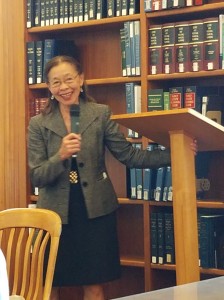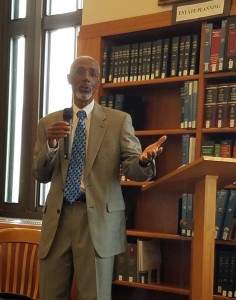Tough Cases: Judges Tell the Stories of Some of the Hardest Decisions They’ve Ever Made, published in September 2018, features essays from U.S. judges who describe the cases that were difficult for them to decide. Two Ramsey Court District Court Judges contributed chapters to this book, and they were the featured speakers at the CLE hosted by the Law Library and the Ramsey County Bar Association on September 16.
In Judge Gail Bohr’s chapter, “A Judge’s Hidden Struggle: Overcoming Judicial Culture” she writes about the difficulties she had as a judge in deciding a custody case. When asked why she chose this case, she responded,
Family law custody cases in the absence of agreement are difficult because they are high conflict cases, and the judge has to decide who will be the primary custodian and what the parenting time schedule for the child will be, among other things. Here, the parents did have an agreement, but the 18 month old baby would bear the brunt of that agreement, moving every day from one parent to the other. Could I, as the decision-maker, over-ride their agreement in deciding the child’s best interests?
While she was deciding this case, her many years of experience as a social worker contributed towards her uncertainty about the custody agreement created by the parents. Her instincts said that the equitable but unwieldy parenting plan was not in the best interest of the child, though the amicable solution would avoid a trial. As it happened, life intervened, and the child was placed with her grandparents when both parents were unable to take on parental responsibilities of raising an infant. Because of this case, Judge Bohr concluded that she could not ignore her life experiences when rendering a decision – and in fact, she needed to rely on those experiences to make the best possible decisions.
But for a completely different kind of case, look no further than the chapter penned by Judge Edward Wilson, who wrote about his experiences serving in Kosovo as part of the United Nations Mission in Kosovo (UNMIK). Judge Wilson, along with other international judges, was there to establish a new, workable justice system in Kosovo to fill the vacuum left by the downfall of Slobodan Milosevic and end of Serbian totalitarian rule.
It was a difficult environment to work in, as there was deep mistrust and hatred on both sides. Because of the enmity and distrust, there was no expectation that trials would be fair, or that the attorneys would be prepared to defend their clients. While UNMIK tried to set up a structure to provide fair hearings, it was hard to overcome the intense antagonism rooted in generations of conflict between the Kosovars and Serbs. Because of this enmity, the local lay people who served as judges on the panels could not be impartial in rendering decisions or determining appropriate punishment.
Although the nascent legal system that he worked with in Kosovo was quite different from the established court system here in Minnesota, Judge Wilson feels that the work he and the other international judges did had a lasting impact on the legal culture of Kosovo. Personally, he enjoyed the experience and learned so much working with other judges from around the world. For anyone who has the opportunity to serve on an international, he strongly encourages you to try it out. Learn as much as you can about the region before you go, keep an open mind, and be prepared to engage with the people and their culture.
While the details and situations that made these cases “tough” for the judges were vastly different, Judge Bohr does see a common thread: “The similarities I see are not so much in the subject matter but in the judges’ inner turmoil as they struggle with the decisions they must make. The book really exposes the humanity of judges as we struggle to arrive at a just and fair decision.”
If you missed their presentation at the Ramsey County Law Library, you will have the chance to see them again. They will be presenting at a CLE program hosted by the Minnesota State Law Library on November 5 at 1:00 p.m. at the Minnesota Judicial Center, room 230.

